Hasidic Tales on God’s Presence in Our Lives
Lesson I
Sandy Kress
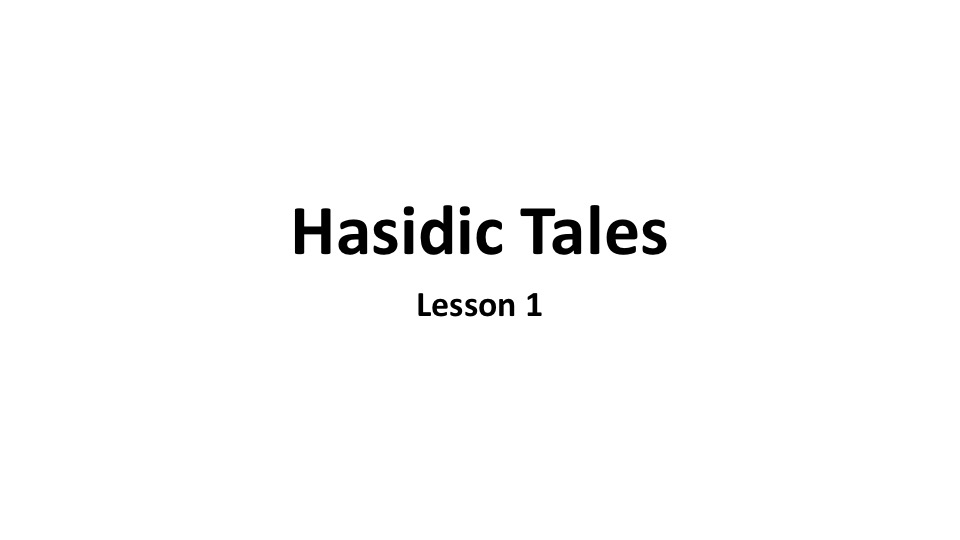
The Hasidic Tales Lesson I
I. Introduction
- What is the Hasidic movement? When did it begin? Who led the way, and why?
What were the key features of their teaching, and how did they affect the
thinking of others, including even us.
An important theme of Hasidism is of God’s continuing presence in our lives, the Divine’s nearness to us. Before we begin the work of looking at Hasidic teachings on this theme, let’s set the stage with an exploration of this question:
What does it mean to be near God? How do we experience God’s
presence? What do we learn from this sense of God’s imminence? How does it
affect the type of people we are and how we live our lives?
We have five Hasidic tales we will read today and have class discussions on what they might mean to us. The five tales, along with the discussion questions used to elicit class participation are presented below.
You can listen to our audio of Sandy's presentation as well as the lively class feedback in the audio here:
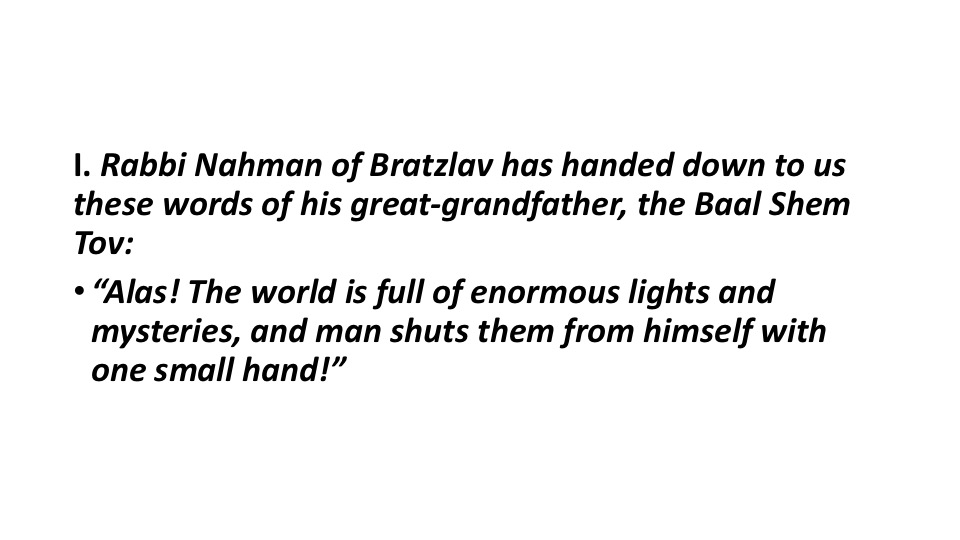
Hasidic Tales - 1
1. Rabbi Nahman of Bratzlav has handed down to us these words of his great-grandfather, the Baal Shem Tov:
“Alas! The world is full of enormous lights and mysteries, and man shuts them from himself with one small hand!”
Discussion:
A. What are the “enormous lights and mysteries” we can’t see if our hand blocks them out?
B. What’s the small hand by which we shut out these gifts of God?
C. The hope of the story, obviously, is that we pull away our hand. What would happen if we did? Do you have a hand that blocks the truly beautiful in your life; what exactly is that “hand”; and if, for, let’s say, a full week, you could pull away your hand and see what had been hidden, what would you see, and would your attitude be changed?
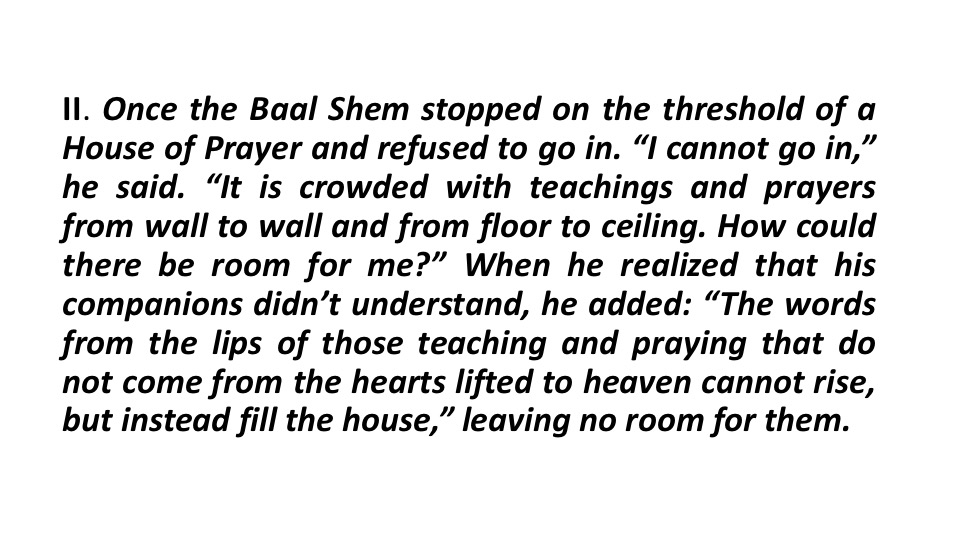
Hasidic Tales - 1
II. Once the Baal Shem stopped on the threshold of a House of Prayer and refused to go in. “I cannot go in,” he said. “It is crowded with teachings and prayers from wall to wall and from floor to ceiling. How could there be room for me?” When he realized that his companions didn’t understand, he added: “The words from the lips of those teaching and praying that do not come from the hearts lifted to heaven cannot rise, but instead fill the house,” leaving no room for them.
A. First, isn’t a room that is full of teachings and prayers always a good thing? How and why might it not be so good?
B. What are those teachings and prayers that do not come from the heart?
C. Have you ever felt the way the Baal Shem Tov is describing in church or synagogue? How?
D. God is always present. The issue is: how present are we? How much do we lift up our teachings and our prayers to be acceptable to God? Would the Baal Shem Tov want to come into our space and bring his companions to learn and pray? Or would he find it too full of those teachings and prayers that fail to rise to heaven? What can we do to make it so there’s more “room?"
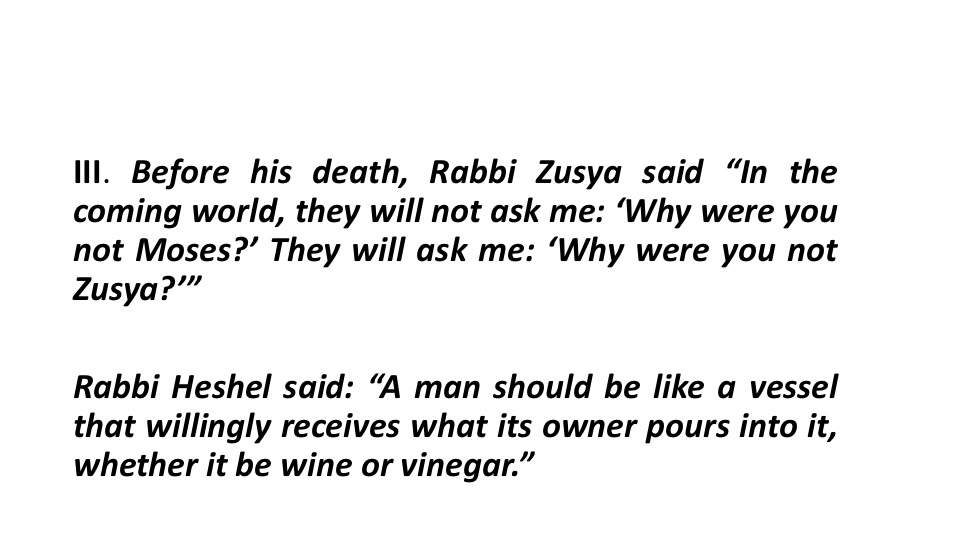
Hasidic Tales - 1
III. Before his death, Rabbi Zusya said “In the coming world, they will not ask me: ‘Why were you not Moses?’ They will ask me: ‘Why were you not Zusya?’”
Rabbi Heshel said: “A man should be like a vessel that willingly receives what its owner pours into it, whether it be wine or vinegar.”
A. Rabbi Zusya’s comment is one of the most popular Hasidic sayings of all time and perhaps my personal favorite. Why does it resonate so?
B. Why might we pair Rabbi Heshel’s wisdom with Rabbi Zusya?
C. So, on that day, in the world to come, if you’re asked by the All-Knowing, “Were you a good you in life,” what would be your answer?
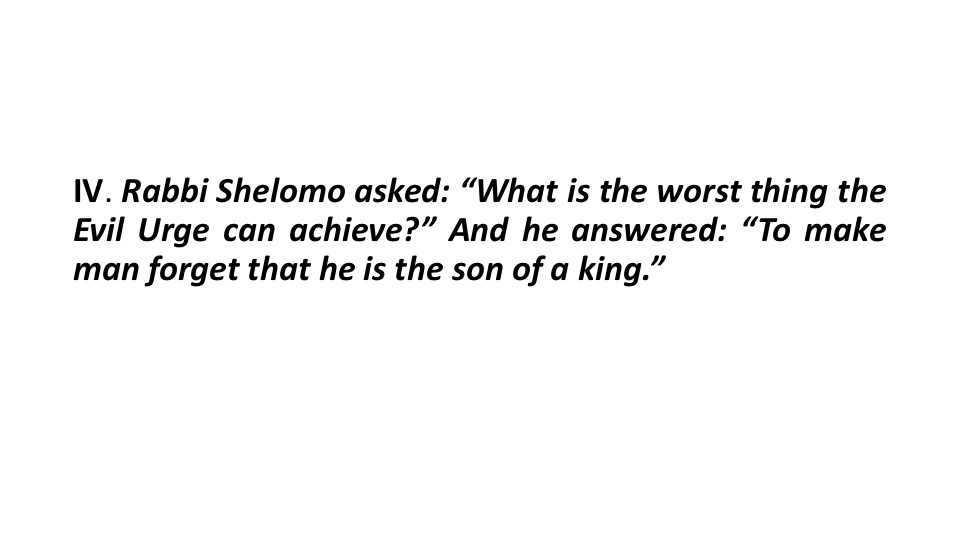
Hasidic Tales - 1
IV. Rabbi Shelomo asked: “What is the worst thing the Evil Urge can achieve?” And he answered: “To make man forget that he is the son of a king.”
A. What is the rabbi’s basic teaching here? What does he mean that man is the son of a king?
B. Why and how does the Evil Urge attempt to achieve this result? And what difference does it make to us?
C. Why does the rabbi say that making man forget he’s the son of a king is the worst thing the Evil Urge can do?
D. What’s the worst result human beings bring about by following the Evil Urge to forget they’re children of the King?
